Ministers voted early Thursday to dramatically tighten the country’s coronavirus lockdown amid fears that the infection rate is spiraling out of control.
The new restrictions come a week after the current lockdown began and as new daily confirmed infections neared 7,000 on Wednesday for the second straight day.
Beginning Friday at 2 p.m., nearly all businesses will be closed, with the exception of specific companies and factories specifically designated as “essential” by the Defense Ministry’s National Emergency Authority. The decision, drafted Wednesday by the coronavirus cabinet and approved by the full cabinet on Thursday morning, exempted supermarkets and pharmacies from the closure, and allowed restaurants to work on a home delivery basis only.
Yom Kippur prayers that begin Sunday evening will take place almost entirely outdoors, with groups of up to 10 worshipers permitted to pray inside synagogues, the decision said. The shutdown will also cover the entirety of the Sukkot holiday.
The holiday season is part of the reason the government was imposing the lockdown now, Prime Minister Benjamin Netanyahu said Wednesday. Since most Israelis in any case don’t work during the holidays, the economic damage of the shutdown would be reduced as fewer workdays will be lost.
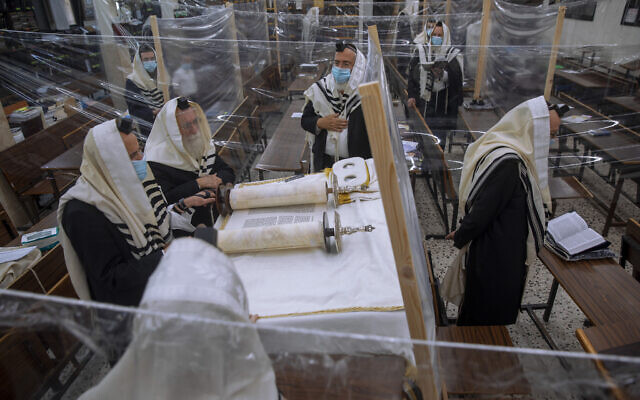
Ultra-Orthodox Jews during morning prayer in a synagogue during a nationwide three-week lockdown to curb the spread of the coronavirus, in Bnei Brak, Sept 21, 2020. (AP Photo/Oded Balilty)
“We’re headed to a shutdown in any case because of the morbidity rate,” Netanyahu said in a video released Wednesday evening. “So it’s better to do it now, during the holidays, at a low economic cost, and not after the holidays when the economic cost will be higher.”
Nearly all public transportation will be closed, as will the last educational institutions still open — mainly special education programs and private preschools.
Israelis won’t be allowed to travel more than a kilometer (0.6 miles) from their homes. Police will be deployed on highways and at the entrances to cities and towns to ensure Israelis don’t attempt to travel during the lockdown.
The cabinet decision said officials from the Finance Ministry, Prime Minister’s Office and National Security Council will meet to set ground rules for which government agencies will close and which ones will remain operational, and at what capacities.
The cabinet is also reportedly considering closing Ben Gurion Airport to outgoing flights, but the decision was not included in Wednesday’s cabinet vote.
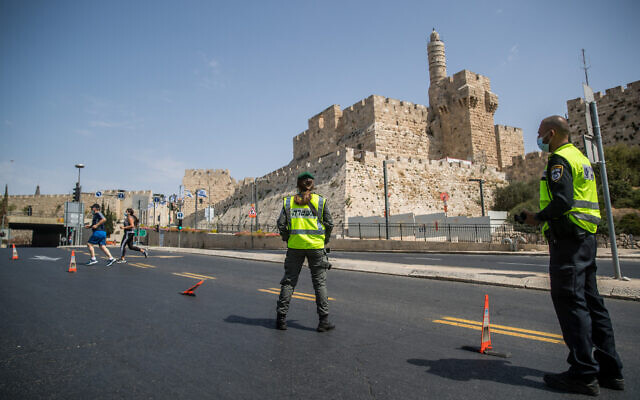
Police at a temporary checkpoint on a nearly empty road outside Jerusalem’s Old City on September 19, 2020, during a nationwide coronavirus lockdown. (Yonatan Sindel/Flash90)
The new rules come after a day of acrimonious debates in the cabinet over whether to allow anti-government protests during the lockdown, with the Blue and White party insisting a government could not order protests against it to disband. Ministers also argued over how much to restrict prayer gatherings, with Haredi parties Shas and United Torah Judaism pushing to leave synagogues open, even if new limits on numbers of worshipers are imposed.
Under a final compromise reached late Wednesday, synagogues will close beginning Friday, open in a limited capacity and with worshipers divided into small groups for the 25 hours of the Yom Kippur holiday, then close again on Monday night. A similar compromise was reached on protests, in which protesters may gather within a kilometer (0.6 miles) from their homes. In both cases, gatherings may include no more than 20 people at a time who must stay two meters apart.
A special compromise was reached allowing for continued protests outside the Prime Minister’s Residence on Balfour Street in Jerusalem, where demonstrators have gathered regularly for months to call for Netanyahu’s resignation.
The compromise was reached after a Wednesday evening phone call between Netanyahu and Defense Minister Benny Gantz as he traveled back to Israel from a working visit to the United States.
A team from the police, the Health Ministry and the attorney general’s office developed a framework allowing for up to 2,000 protesters to take part in the Balfour Street demonstrations. As with prayer gatherings and protests elsewhere in the country, they will be divided into 20-person “capsules” and keep two meters’ distance from each other. All protesters at Balfour must live within a kilometer of the site in downtown Jerusalem.
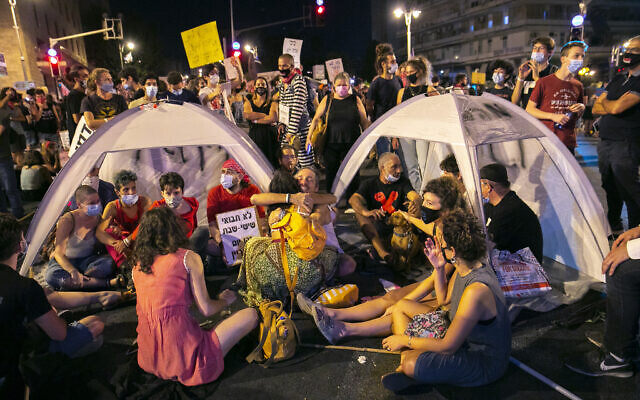
Israelis protest against Israeli prime minister Benjamin Netanyahu at Balfour, outside the PM’s official residence in Jerusalem on September 20, 2020. (Olivier Fitoussi/Flash90)
While ministers briefly considered declaring a “national emergency” to bypass the Knesset and impose the heightened restrictions, the new limits are nevertheless slated to come up in the Knesset plenum for approval on Thursday. The Knesset will be asked to amend legislation that prohibits restricting protests, in order to allow for the one-kilometer-from-home limit for attending them.
The final cabinet decision had its critics in both Likud and Blue and White.
Finance Minister Israel Katz of Likud lambasted the shuttering of nearly all economic activity for two weeks, a decision that contradicted the recommendations of the Finance Ministry last week. Katz was one of the very few ministers who voted against the shutdown in the cabinet.
“It’s possible to take steps to rein in the disease without critically hurting the factories and businesses of the private sector, the ones that aren’t open to the public and are careful to obey Health Ministry guidelines,” he said after the cabinet vote. “Israel’s economic resilience is part of its national resilience; it must be protected too.”
Science Minister Yizhar Shai of Blue and White left the cabinet meeting in protest, leaving a written vote against the decision. Shai, too, objected to the sweeping closure of the economy, which he said contradicted the recommendations of the professional echelon.
Bank of Israel Governor Amir Yaron also protested the final decision as causing too much damage to the economy, as did the government coronavirus czar, Ronni Gamzu, who reportedly told ministers he had recommended a 50 percent reduction in economic activity, not the comprehensive lockdown eventually voted on by ministers.
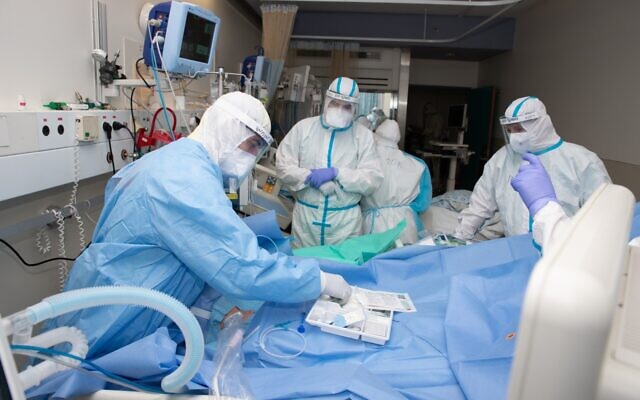
Medical staff treat a coronavirus patient at Shaare Zedek Medical Center in Jerusalem, July 2020. (Tal Cheres)
Some senior members of the government accused Netanyahu of seeking a full economic shutdown as a means of ending the protests against him, after Blue and White had said it would only support ending protests if the situation required that all other public activities cease as well.
The decision “can’t contradict the recommendations of the professionals because of political considerations,” Foreign Minister Gabi Ashkenazi, of Blue and White, protested on Wednesday evening. “A full lockdown is our last option, it’s not meant to ‘solve’ the protests.”
The “Black Flags” group that has organized some of the anti-government protests released a statement saying it would acquiesce to the new restrictions, while blaming Netanyahu for the new shutdown.
“This is a difficult hour for the people of Israel. The country is diving into an abyss because of Netanyahu’s never-ending failures,” the group said. “He alone is responsible for the greatest failure in the country’s history.”
Officials defended the closure by explaining that previous measures had failed to contain the virus’s spread, in part because of low levels of adherence to government rules.
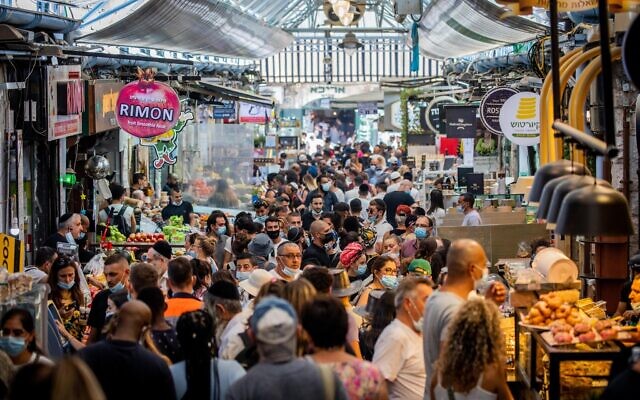
People wearing face masks as they shop at the Mahane Yehuda market in Jerusalem on September 4, 2020. (Yonatan Sindel/Flash90)
The IDF’s Home Front Command, which is building the national contact-tracing and epidemiological investigation system expected to be deployed in a few weeks to help stem infections without repeated shutdowns, said Wednesday that it estimates that as many as 41% of Israelis required under the existing rules to self-quarantine have not obeyed the quarantine rules.
Similarly, Interior Minister Aryeh Deri of Shas defended the decision in the face of Haredi criticism over the curtailing of synagogue gatherings, explaining that “many sick people who didn’t know they were sick came to synagogue on Rosh Hashanah [over the weekend], and infected many of those who are now sick.”
Speaking to the Haredi radio station Radio Kol Hai, Deri said the cabinet had seen “very difficult figures and heard the most frightening predictions from top doctors.”
According to the latest Health Ministry figures, 54,364 people received test results on Wednesday and 6,808 were confirmed as carriers of the coronavirus. It was the second day in a row with over 6,000 confirmed coronavirus cases, and officials have said they are especially worried about the 12.4% confirmation rate. Health Ministry Deputy Director General Itamar Grotto told lawmakers last week that restrictions should only be lifted when that rate drops below 7%.
 RSS Feed
RSS Feed















 September 24th, 2020
September 24th, 2020  Awake Goy
Awake Goy  Posted in
Posted in  Tags:
Tags: 













